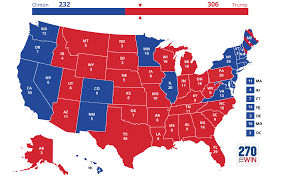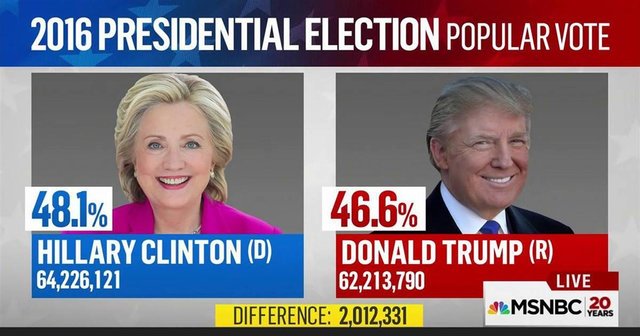The Electoral College
Too many people today want to abolish the Electoral College when they don't even understand where it came from or why it exists. As I have learned many times through hard experience, it is never a good idea to abolish a practice/law/rule unless you completely understand why it even exists in the first place.
I could write a very long, in-depth description of the history of the Electoral College, how it was supposed to operate, ways that it doesn't live up to it's original purpose, ways the process has been changed over time, etc., but if you are really that interested in the process you can read all of that information in other places. Instead, let me just explain the most important parts.
The first thing you need to understand is that the Electoral College was created as a COMPROMISE. The best way to understand a compromise is to look at the two competing proposals that existed before the compromise was reached. I'm going to simplify both positions significantly here.
Here is what the actual Electoral College votes looked like for the 2016 Presidential Election as can be seen on www.270towin.com:

The first proposal is probably obvious - elect the President as a result of the popular vote. This proposal has some merit. After all, we want a President that can appeal to the most people, who will represent the most people, and who feels accountable to the people. The popular vote fulfills all of these objectives.
The second proposal seems to have been lost over time, but it has equal merit. This suggestion is that each state should get one vote in the election for the President. That may seem unfair, but in some ways it may actually be more fair than the popular vote. The argument behind this strategy is that people within a state tend to have similar views and needs. It's actually more true to say that the needs and views of people who live in big cities are significantly different than those who live in rural areas. Even if everyone has good intentions and wants to help each other, people in big cities don't understand the needs of people in rural areas, and even worse they probably don't even realize that the needs are different. If you rely on the popular vote alone, due to the fact that a lot more people happen to live in cities the people who live in cities will end up trampling all over the rights and needs of those who live in rural areas without even realizing it. Since some states are more rural than others, by giving each state just one vote you make it possible for people who live in rural areas to stand up for their own unique needs, (although it would be even purer to give rural areas votes equal to big cities, but that would be really hard to design). There are also unique needs for states that live on the border, states that flood regularly, states that experience regular droughts, states that have lots of earthquakes, etc. In a popular vote, each of these unique needs can be ignored or forgotten.
The original idea behind the United States was that each state was kind of like its own unique country, and the United States was intended to be a higher government that united each of the states and provided for their common needs like military needs. In other words, the United States was supposed to be our version of the United Nations. In the UN, leaders are chosen by the countries. Wouldn't it be weird if we elected the President of the United Nations General Assembly by popular vote of all countries that are in the UN? There could be some argument in favor of that, but there would be a lot of problems with it as well. First of all, if the population of China united in their votes they would basically pick the President every single election. Even if every person in the United States voted for a different candidate, our votes would be completely meaningless because our population is so low compared to China. That may not seem like a big deal to some, but it would be a big deal to me. Basically, the UN would become an entity that was run by China for China. Why should the United States agree to be part of an organization that doesn't represent it? Apart from our desire to get along with the rest of the world, basically we shouldn't be a part of an organization that doesn't represent us. Membership in the UN is to some extent voluntary. And if all countries drop out of the UN except for China the UN has no purpose to exist. So while China might enjoy its power in the beginning, eventually even China would be hurt by this system.
The same arguments apply to states. Why should Wyoming submit to a government that is basically making rules by California and New York, for California and New York? We all have SOME common interests, but it is unlikely that a law maker from New Jersey who has never visited Kansas understands the needs of farmers in Kansas. And if the farmers in Kansas have no voice, a law maker from New Jersey has no reason to learn about the needs of farmers in Kansas. If we go to a true popular vote to determine the President of the United States of America, it would honestly make sense for MANY states to secede from the Union because they are honestly no longer receiving any representation at the Federal level anyway. That isn't completely true. States are still represented in the Senate. But if the Senate was dissolved AND the president was elected by popular vote, (which has been suggested), it would be incredibly foolish for any state that has 10 Electoral Votes or fewer to remain in the Union.
Too often, we want to design procedures based on the outcome. This may sound good in the present, but you have to remember that once you create a bad procedure it will be used forever more. Most people who currently want to do away with the Electoral College want to do so specifically because of the election of Donald Trump. That may seem satisfying now, but 50 years from now there will be very different candidates running for election. The rules you change today could lead to someone you despise being elected in 50 years. Never forget that.
As a side note, I would also like to point out that in our presidential election, the presidential candidate is required to win a MAJORITY of the vote, not a PLURALITY of the vote. What is the difference? Let's pretend that we have 4 candidates running for President. The person who receives the most votes won a plurality of the vote. But unless that person won MORE THAN 50% of the votes he or she did not win the MAJORITY of the vote. I personally voted for Gary Johnson in the last election. If you wish that Hillary Clinton had won the last election, changing the vote from the Electoral Vote to the Popular Vote would not have made her win. She still would have lost. You see, in the 2016 election Hillary Clinton won 48.2% of the vote, and Donald Trump won 46.1%. Hillary Clinton won a PLURALITY of the popular vote, but she did not win a MAJORITY of the popular vote. There were just enough people like me who voted for other candidates that neither of the two major candidates managed to win a majority. According to the Constitution, if no candidate wins a majority of the vote, then the House of Representatives holds a contingent election to elect the President. And at the time the House of Representatives was controlled by the Republicans. As much as these Republicans despised Trump, I can't imagine any scenario where a Republican-controlled House of Representatives would have elected Hillary Clinton.
Here are the 2016 Election Population Vote Results as reported by MSNBC:

Next time you hear someone say we should abolish the Electoral College and/or the Senate, remember that it is a much more complicated situation than most people think. Think of the many people in small states who live in rural areas who already believe the government doesn't care about them or understand them and that don't feel the government represents them. Remember that even if the popular vote replaced the Electoral College in 2016 Donald Trump would still be our president today. And remember that our Founding Fathers worked really hard in designing a system that would balance the rights of the majority with the rights of the minority. Also, realize that if populous states push to abolish the Electoral College that smaller states will immediately insist on replacing the Electoral College with one vote per state instead of replacing it with the popular vote. And realize that based on the way the Constitution currently allocates power for Constitutional Amendments, we are much more likely to pass a one-state-one-vote measure than we are to pass a popular vote measure.
Yes, I am biased in favor of the Electoral College, but even if I personally supported the idea of a popular vote I would still be very hesitant to open that particular can of worms. You never know what might crawl out of it.